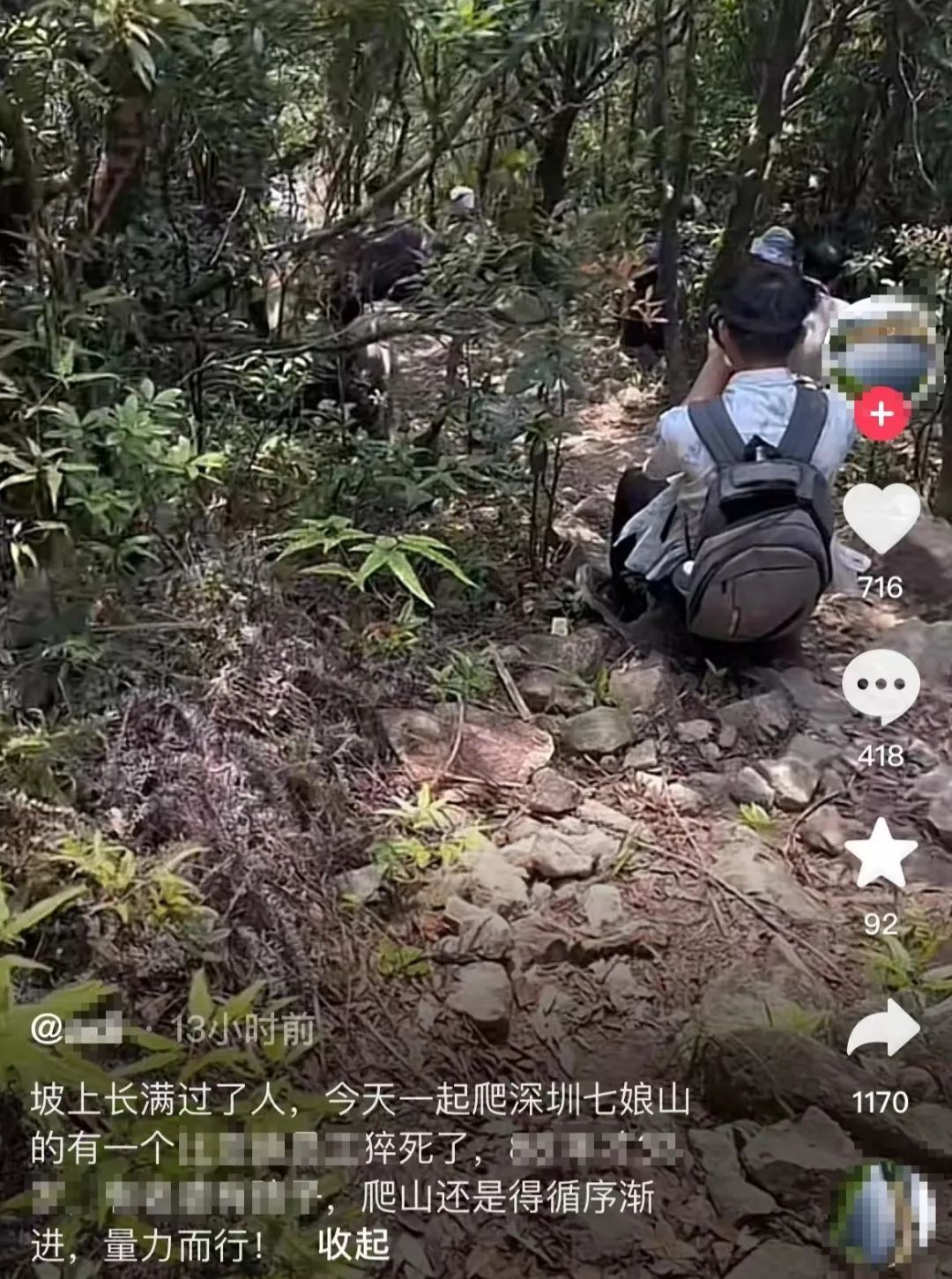A man died suddenly while climbing a mountain! Important reminder →
On April 13th, a netizen posted a video saying that a man died suddenly while climbing Qiniang Mountain. On April 14th, the reporter learned from the local police that the incident was true.
According to the video released by netizens, it is said that "one of the people who climbed Shenzhen Qiniang Mountain together died suddenly today, and climbing the mountain still has to be done step by step and according to one’s ability!"

On April 14th, the reporter learned from the local police that an alarm was received on the morning of the 13th. The local police said: "We know about this matter. After we went, there were emergency personnel who carried out first aid at the scene and didn’t save it. Other specific contents are not convenient to disclose. "
The weather is fine.
There are more people going out for hiking.
But don’t forget that health comes first.
■ people who are not suitable for mountaineering
1. Chronic diseases
Hypertension, nephropathy, hematological diseases, chronic tracheitis and gout.
2. Joint diseases
When climbing, the extra load of knee joint will aggravate cartilage wear, damage bone, and cause discomfort symptoms such as joint swelling and pain.
3. Cardiovascular and cerebrovascular diseases
Mountaineering is a sport that consumes a lot of oxygen and physical strength. Mountaineering for the elderly will increase the heart load and easily induce diseases.
■ Knee joints should be protected.
When climbing, you need to go up and down the steps frequently, which puts great pressure on the knee joint. Therefore, for patients with knee osteoarthritis, meniscus injury, joint degeneration, heel pain, calcaneal spur, etc., climbing needs to do what you can, and don’t blindly follow suit.
In addition to wearing knee pads, healthy people can also prepare climbing poles and other auxiliary equipment to reduce joint stress. Climbing without viewing, viewing without climbing, be sure to pay attention to your feet when you are at a height to prevent accidents such as stepping on the air, spraining and falling.
■ Allergic people need to pay attention
Spring is in full bloom, and walking all the way to enjoy the blooming spring flowers during the mountaineering process makes people feel comfortable. However, people with allergic asthma, allergic conjunctivitis and allergic rhinitis need special attention, and because the mountaineering process is aerobic exercise, the breathing frequency and depth are obviously enhanced, which is more likely to lead to inhalation of more allergens such as pollen and catkin, resulting in illness. Such people should pay attention to protection when they go out, wear masks and glasses, wash their noses and eyes with clean water when they get home, and take anti-allergic drugs when necessary.
■ Don’t take the wild road to prevent snakes.
When spring comes, all kinds of dormant insects and snakes will move. These animals often haunt the sparsely populated mountain areas. When outdoor activities, try to avoid taking wild roads, dense forests and grass to prevent mosquito bites. When going out, you can bring some wind oil and cool oil for emergencies. Hibernating snakes will also come out of the hole at this time, mostly in the warm sunny slopes of mountains and bamboo forests. If you are bitten by snakes in the wild, you must not suck out the venom with your mouth, and you should go to the hospital immediately.
■ Wild fruit mushrooms cannot be picked.
Wild vegetables must be familiar with the varieties before they can be mined. Many wild fruits are attractive in color, such as raspberry, raspberry, etc. They all look like small red berries, but raspberry is a little poisonous, which is difficult for non-professionals to identify, so picking is not recommended. Nandina domestica, commonly used in flower arrangement, is a festive red fruit, but its whole plant is toxic, and the fruit is more toxic, which can cause poisoning once eaten. There are bacteria growing in many forests on the mountain, so it is not possible to judge whether they are non-toxic according to their bright colors. It is not recommended to pick them for consumption.
Comprehensive xiaoxiang morning herald, China Chinese Medicine News, public information, etc.
]